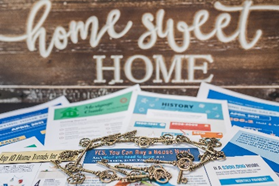
Photo by micheile henderson on Unsplash
Part 1 of Our Two-Part Series:
According to the National Association of Realtors, the most difficult step for buyers is saving for a down payment.
20% down is the market standard- although you may qualify for as little as 3.5% (FHA). It’s still a daunting challenge for many buyers to save even that 3.5% for a $300,000 purchase - which would amount to $10,500.
So, what do you do?
Here are The Milestone Team’s first five tips to get you on the road to home ownership and your own special place in the world:
- Create a vision board. Using a corkboard – or even your refrigerator! – display images of beautiful living spaces, décor you love, gardens you would want. The inspiration helps you prioritize saving for your special place versus spending impulsively.
- Get on a budget.Review and reduce your spending to maximize your monthly savings. Some ideas:
- Choose a “staycation:” Vacations can cost $2000 or more for a typical family. Check out local events, places to explore & stay, and put that extra cash towards your downpayment!
- Try a no-spend challenge. Each month, only spend on necessities and a few dollars for fun-money.
- Pay yourself first. Financial experts recommend “paying” yourself by setting aside 20% from each paycheck. Automate your savings by setting up an automatic transferwith your bank.
- Pay off debt. This seems counter-intuitive – “Shouldn’t I be saving every dollar towards my downpayment?” Every dollar that’s not costing you, yes. Paying off high-interest credit cards and auto loans not only saves you on interest each month, but also reduces your debt-to-income ratio and increases your credit score – which will help you qualify for your mortgage.
- Bank your next raise or tax refund. Yes, you really want that new flat screen television – but making the temporary sacrifice adds those extra funds to your down payment account!
Want more expert advice to save for your dream home? See our Part 2 later this month!

Home Buying Trends in 2022
Since 1981, the Nat’l Assoc. of Realtors has published an annual report providing insight into buying and selling behaviors. Below is some interesting data on buyers from the 2022 Profile of Home Buyers and Sellers.
- First time buyers made up 26% of all buyers, down from last year’s 34% and is the lowest number in 41 years.
- The distance buyers moved from their last home to their new one increased from 15 miles to 50 miles as buyers looked to small towns and rural areas..
- 49% of buyers cited quality of the neighborhood as the most important factor in determining location.
- They typical home purchased was 1800 SF, 3 bedrooms, 2 baths, built in 1986.
- Most buyers expected to live in their home for a median of 15 yrs.
- 86% of buyers purchased their home thru a real estate agent. 89% would use their agent again or recommend their agent to others.
- 88% of buyers reported they view a home purchase as a good investment.
This is a small sample of the characteristics of home buyers in 2022. If you’d like to know how current trends and behaviors impact your goals of buying or selling, then contact me.

Contact Donna Forest: 603-526-4116; www.DonnaForest.com; Donna@DonnaForest.com
You’ll be moving in the right direction with Better Homes & Gardens Real Estate - The Milestone Team

What the Experts Predict for 2023
The popular term for 2022 was it’s a “shifting market”. In other words, the exuberant days of low interest rates and over asking prices from the previous 2 years were disappearing. Here’s what the experts are predicting for 2023.
- If inflation is high, mortgage rates will be high. But if inflation continues to fall, rates will likely fall as well. Lawrence Yun, Chief Economist for the Nat’l Assoc. of Realtors, expects rates to be at 5.7% by year end. Fannie Mae and Freddie Mac are projecting around 6%.
- Housing inventory is expected to remain tight (putting upward pressure on home prices). Sales are down 17% in NH for 2022 from the previous year. For the U.S., Yun predicts sales to fall 6.8% in 2023 compared to 2022. Higher interest rates have tempered buyer demand as well.
- Home price appreciation could go up or down. Some experts predict up to 5.4% appreciation while others say prices could depreciate as much as 5.1%. Most likely appreciation will be relatively flat or neutral. Some areas could see small price gains and others may see slight price declines.
Moderation might be the new catch phrase for 2023. Rates are expected to stabilize, the volume of sales will be less, and home appreciation may be relatively flat, depending on where you live. Whether buying or selling, contact me to know how this market impacts you.

Contact Donna Forest: 603-526-4116; www.DonnaForest.com; Donna@DonnaForest.com
You’ll be moving in the right direction with Better Homes & Gardens Real Estate - The Milestone Team

Wondering About Mortgage Rates & Home Prices?
Will Mortgage Rates Keep Rising?
The Federal Reserve is trying to lower inflation by increasing the federal fund rates and slow the economy. The Fed doesn’t set mortgage rates however their actions impact these rates. While inflation is high, we will see high mortgage rates. NAR Chief Economist, Lawrence Yun, says rates could continue to increase; adding that 7% looks to be the level the rest of this year and most of next year. He predicts within 2 yrs. the rate should return to 5.5%-6%.
Where are Home Prices Heading?
We continue to have more buyers than sellers in the market so it’s still a sellers’ market. The most recent NHAR report for October showed only a 1.7 month supply of homes to sell (a balanced market is 6 months). Some experts are calling for a little price appreciation next year and others project slight depreciation. Yun foresees zero or minor changes next year, with a swing in either direction. The overheated markets where prices shot up rapidly will see more of a shift in prices. In 2024 and beyond, the experts expect to see more normal appreciation (typically 3-4%) in the years ahead. Yun is predicting a 5% price jump in 2024. Pricing all depends on the local market and factors such as the balance between supply & demand. In NH thru Oct., prices are up 13.5% and homes sold 102.6% of the listing price.
If you are considering buying or selling, contact me for the best advice on making your next move.
Contact Donna Forest: 603-526-4116; www.DonnaForest.com; Donna@DonnaForest.com
You’ll be moving in the right direction with Better Homes & Gardens Real Estate - The Milestone Team

Slowdown or Bubble?
The headlines today are attention grabbing. Recession, housing bubble, dropping prices. News is designed to get you to watch more news – not educate you. Fear sells. If you look at the data, there is no case to be made for a national bubble or housing crash. Here’s why:
Since 2008, lending standards are much stricter. The exotic programs are gone and there are now better qualified buyers. Foreclosures have been trending down since 2010 – 2.9M in 2010 to 151K in 2021. Today, only 0.4% of homeowners are facing foreclosure and about 91% of these have at least some equity built up. US households own 41 trillion dollars in owner occupied real estate. There is 12 trillion in mortgage debt, leaving 29 trillion in equity. That’s a big number!
Inventory is still historically low. In the US, it is up 27% year-over-year as of Sept. 9th. Compare this to 2019 where it was 43.2%. In NH, new listings as of Aug., are down 22% and there is only a 1.6 month supply of homes to sell. (A balanced market has a 6 month supply).
Price appreciation is slowing but not depreciating. Experts forecast an avg. gain of 11.3% for home prices in 2022 and 2.5% for 2023. YTD thru Aug., the median sales price in NH is up 14.5% compared to Aug. 2021.
Rates are rising in response to inflation. Over the past 5 recessions, mortgage rates have fallen an avg. of 1.8% from the peak to the trough.
Buyer demand has moderated compared to the frenzy of the last 2 years, however showing activity is still beating pre-pandemic levels. Interest rates will fluctuate, and pricing is all about supply & demand. Housing is traditionally one of the first sectors to slow as the economy softens but is also one of the first to rebound. Don’t let fear stop you from buying or selling today. Contact me to work with a professional to help guide you thru this process.
Contact Donna Forest: 603-526-4116; www.DonnaForest.com; Donna@DonnaForest.com
You’ll be moving in the right direction with Better Homes & Gardens Real Estate - The Milestone Team
Top 5 Loan Killers
If you plan on getting a mortgage or have already started the loan process, you need to be extra cautious with your finances. Here are the top 5 show stoppers you should avoid.
- Purchasing large ticket items. Don’t buy a new car or even furniture until after the loan closes. New payments will impact how much money you can borrow or can even prevent you from qualifying for a loan.
- Paying late on bills. One 30-day late payment can subtract 80 to 110 points from your credit score. Many lenders require at least 12 consecutive months of on-time payments
- Shuffling money around. Lenders scrutinize all your bank statements as part of the approval process. Any unusual deposits or withdrawals will require clear documentation of what they are. A large sum of money transferred into an account right before closing could be lethal.
- Job changes. Taking on a new job can present some hurdles as lenders like stable income that will likely continue. Changing job fields or starting your own business will be a red flag.
- Getting a new credit card. Even something as simple as getting a Kohl’s credit card will impact your credit score.
Give me a call if you want to work with a Realtor who can help you avoid the common pitfalls when buying your dream home.

Contact Donna Forest: 603-526-4116; www.DonnaForest.com; Donna@DonnaForest.com
You’ll be moving in the right direction with Better Homes & Gardens Real Estate - The Milestone Team
What You Need to Know About the Housing Market
It seems like the term “housing recession” is in everything you read and see on the news. Since I was not even sure what this means, I researched what the experts are saying and found the following:
- Home sales are slowing, with a projection of 5.1M (million) by year end. It is quite a drop compared to the heyday of the last 2 years; there were 6.1M sales in 2021 and 5.65M in 2020. However, looking back at the more “normal” years with 5.25M in 2019 and 5.3M in 2018, 5.1M doesn’t seem as dramatic.
- Lawrence Yun, chief economist for the Nat’l Assoc. of Realtors states "We're witnessing a housing recession in terms of declining home sales and home building," "It's not a recession in home prices," Yun added. "Inventory remains tight and prices continue to rise nationally with nearly 40% of homes still commanding the full list price."
- In NH, sales are down 15% thru July compared to 2021. The median selling price is up 14.8% at $445K and the state has 1.7 month supply of homes to sell. Anything less than 6-7 month supply is a sellers’ market. In the US, the median price is $403,800, up 10.8% from July 2021 and there is a 3 month supply of inventory.
- Experts predict the following mortgage rates - 5.3% 4th Q this year, 5.2% 1Q 2023, 5.18% 2Q 2023, and 4.97% 3Q 2023. Historically still a “low” rate considering between April 1971 and June 2022, 30-year fixed-rate mortgages averaged 7.77% (from Freddie Mac records).
The market has changed from the last two years. Fewer bidding wars, houses staying on the market longer than a weekend, offers being accepted with contingencies. While still a sellers’ market for now, buyers should see more inventory slowly come on the market with a little fluctuation in interest rates. Contact me for more details on how the market impacts you.
Donna Forest ~ donna@donnaforest.com ~ 603-731-5151

A Recession Doesn’t Equal a Housing Crisis
Are you wondering how a recession affects the US housing market? Here are a few key points to help put some perspective on its impact.
- Interest rates go up at the beginning of a recession but are then lowered to stimulate the economy to move forward. Over the past 5 recessions, rates have fallen an avg. of 1.8% from the peak to the trough. Bear in mind interest rates will most likely rise until inflation peaks.
- Four out of the six times we were in a recession, home prices appreciated. They fell only twice – once marginally in the early 90’s and in 2008.
-
- The number of offers received on a home has dropped from an avg. of 5.5 offers in April to 4.2 in June. Still well above the pre-pandemic norm but this shows a moderating of the market.
-
- A month ago, 61% of offers were over asking and this has now softened to 55% over asking price on the avg. home sold. Not a huge decline but still a sign of the times.
-
- There is a slowdown in the pace of sales. It is looking more like it did in 2018 and 2019, which by the way, were great years for real estate.
-
- Active inventory is growing but there are still way more buyers than we have sellers. This will continue to put upward pressure on prices.
-
Whether buying or selling, contact me to make an informed decision on planning your next move.
 Donna Forest ~ donna@donnaforest.com ~ 603-731-5151
Donna Forest ~ donna@donnaforest.com ~ 603-731-5151
Real estate markets are local, and we have the real scoop on ours.

Is Now a Good Time to Buy?
Despite headlines about high interest rates, a recession, and some even saying there is a housing bubble, the reality is that it’s still a good time to buy a home. And below are the reasons why!
- The number of homes for sale are increasing. Danielle Hale, Chief Economist for realtor.com, said new listings were up 6% above one year ago.
- Buyer demand has moderated with the higher interest rates, which means buyers should face lower competition at a less frenzied pace.
- Experts are forecasting homes to continue to appreciate in price. None are saying prices will fall. The home price forecast for 2022 averages out to an increase of 8.5%. After 2022, the home prices are expected to increase 3-4% each year.
- Rents are rising faster than they have in years due to the high demand. Buyers with a mortgage can at least know the majority of their monthly housing costs will remain fixed going forward.
- Interest rates over the last few years were artificially low as the Feds tried to boost economic activity. The latest rates are still comparatively low when looking at them historically since 1971. An average 30-year, fixed mortgage rate of around 6% is still well below the historical average of nearly 8 percent.
There is no perfect advice as to when to buy a house. However, don’t base your actions on what you read in the headlines as waiting could cost you. It’s a personal decision based on your finances and goals. Contact me for expert guidance on buying your dream home.

Donna Forest ~ donna@donnaforest.com ~ 603-731-5151
Real estate markets are local, and we have the real scoop on ours.

What to Know About the Market
With mortgage rates inching up and prices still climbing, there is a shift from the “anything goes” housing market we saw the last two years. Here are some takeaways from what I’ve recently been reading.
The market is not about to crash. It appears to be a turning point towards more typical pre-pandemic levels. Mark Fleming, chief economist at First American says “. . . today’s housing market looks a lot like the 2019 housing market, which was the strongest housing market in a decade at the time.”
- Demand for housing exceeds the current supply. The US has underbuilt single family housing by 4.3 million units since 2000. Households are forming faster than builders can create new housing. This deficit is predicted to continue over the next 10 plus years. This will continue to drive prices up.
- The rate of appreciation is expected to slow – but not drop. The expectation is in a year from now, prices will be higher than they are currently.
- Lenders are vetting buyers more stringently, unlike the last housing bubble. Over 70% of mortgage dollars are to buyers with 760+ credit scores, compared to pre-2008, when that number was under 25%.
- If you don’t plan to be in your home for more than 5 yrs. or so, buyers should consider a 5-yr. adjustable rate mortgage, which has a lower interest rate than a 30-yr. fixed.
The market is shifting. Whether buying or selling, contact me to help you navigate these changes.
Donna Forest ~ donna@donnaforest.com ~ 603-731-5151

